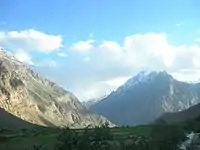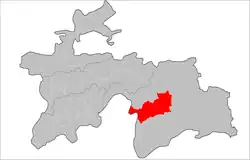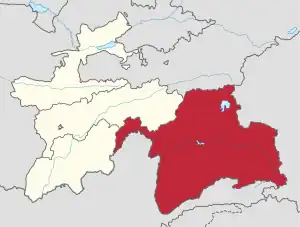Rushon District
Rushon District (Russian: Рушанский район Tajik: Ноҳияи Рӯшон, Nohiyayi Rushon, IPA: [nɔːhijaˈji rɵˈʃɔːn], Persian: شهرستان روشان Ręxonzemath) is a district in east Tajikistan, in the west-central part of the Gorno-Badakhshan Autonomous Region (GBAO). It stretches along the river Bartang between the Yazgulem Range to the north and the Rushon Range to the south.[3] Its capital is Rushon, also known as Vomar (pronounced: vamar), situated on the border with Afghanistan, 65 km north of Khorugh (the capital of GBAO) along the river Panj and the Pamir Highway. The population of Rushon district is 25,800 (1 January 2020 estimate).[1]

Rushon District
| |
|---|---|
| Ноҳияи Рӯшон | |
 Location of Rushon District in Tajikistan | |
| Coordinates: 38°00′N 72°05′E | |
| Country | |
| Region | Gorno-Badakhshan Autonomous Region |
| Capital | Rushon |
| Area | |
| • Total | 5,870.7 km2 (2,266.7 sq mi) |
| Population (2020)[1] | |
| • Total | 25,800 |
| • Density | 4.4/km2 (11/sq mi) |
| Time zone | UTC+5 (TJT) |
| Postal code | 736200 |
| Area code | +992 3556 |
| Official languages | |
| Website | rushon |
Rushon District is home to Sarez Lake, which was formed as a result of an earthquake in 1911 in Bartang valley in the east of the district. Called "the Sleeping Dragon" by the native population, Sarez Lake is attracting growing attention of national and international experts for the study and mitigation of its potential threat of collapsing and causing devastating floods and landslides.[4]
Administrative divisions
The district has an area of about 5,900 km2 (2,000 sq mi) and is divided administratively into seven jamoats.[5] They are as follows:[6]
| Jamoat | Population (Jan. 2015)[6] |
|---|---|
| Tagovad (Abdulvosiev) | 2,331 |
| Bartang | 2,185 |
| Basid | 1,480 |
| Bar-Rushon (Dodkhudoev) | 6,128 |
| Past-Khuf | 3,208 |
| Rushon | 6,577 |
| Savnob | 3,047 |
Infrastructure
Rushon (Vomar) has a hospital, post office, bank offices (Orienbank, Agroinvestbank). Also it has a small airport without a paved runway that has the capacity to service small aircraft like AN-28. The district also has one hydropower station in the village of Shujand (10 km from the district center) with a capacity of 600 kW. An additional diesel unit was built during the Soviet times, to meet the energy needs of the district, which was abandoned after the dissolution of the Soviet Union and has not been functional ever since.
Language and culture
Rushani language is spoken here. Rushon is renowned for its arts and musical traditions. Many famous musicians including Gurminj Zavkibekov, Mohjon Nazardodova, Musavar Minakov, Sherali Abdulkaysov, Jonboz, Davlatyor Kurbonmamadov, Muboraksho Mirzoshoyev, Nobovar Chanorov, Daler Nazarov, Nargis Bandishoeva are natives of this district.
See also
Rushan people
References
- "Population of the Republic of Tajikistan as of 1 January 2020" (PDF) (in Russian). Statistics office of Tajikistan. Retrieved 3 October 2020.
- "КОНСТИТУЦИЯ РЕСПУБЛИКИ ТАДЖИКИСТАН". prokuratura.tj. Parliament of Tajikistan. Retrieved 9 January 2020.
- Republic of Tajikistan, map showing administrative division as of January 1, 2004, "Tojikkoinot" Cartographic Press, Dushanbe
- "Waiting for the Dragon to Wake Up", Los Angeles Times, 22 July 1999
- "Regions of the Republic of Tajikistan 2017" (PDF) (in Russian). Statistics office of Tajikistan. pp. 15–21. Retrieved 12 October 2020.
- Jamoat-level basic indicators, United Nations Development Programme in Tajikistan, accessed 3 October 2020
